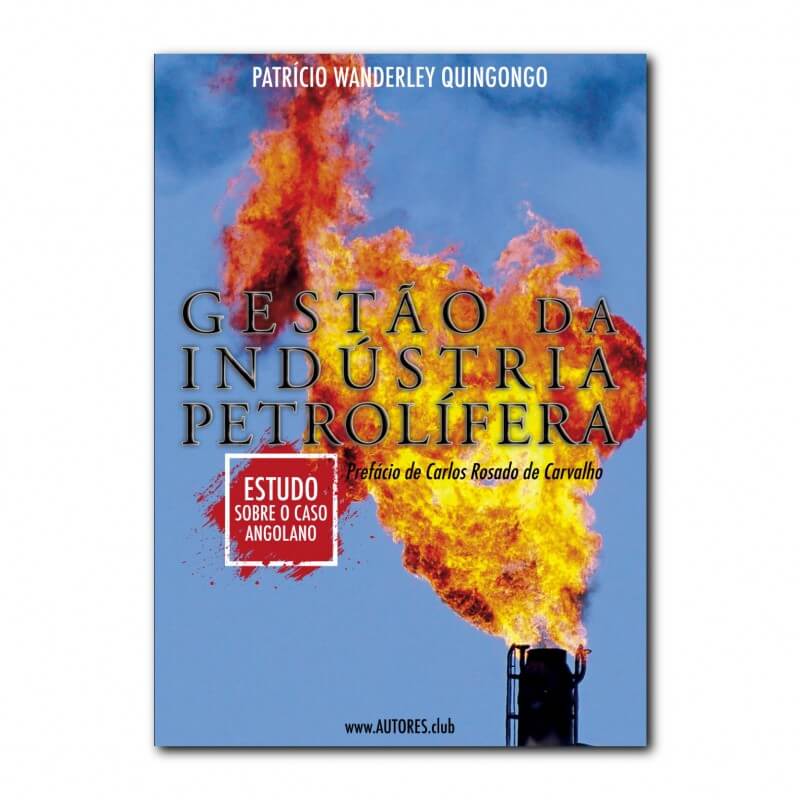








Author: Patricia Wanderley Quingongo
Publisher: Perfil Criativo - Edições
Year of publication: June 2018 - First edition
ISBN: 978-989-99924-9-8
Legal Deposit (Angola):8358/2018
Legal Deposit (United Kingdom):439494/18
Number of pages: 122
Cover: Mole with badanas
Measurements (Alt. x Larg. x Lombada): 170 x 240 x 11 mm
Weight: 0.260 Kg
Collection: -
Comments: —
Observations: This book can be ordered in bookstores in Angola and Portugal
Language: Portuguese
 SECURITY
SECURITY
AUTORES.club uses security measures.
 DELIVERIES
DELIVERIES
Portugal: 4 days; Europe: 10 days; Rest of the world: 20 days.
 RETURNS
RETURNS
You can return your order within 14 days.
(+351) 214,001,788 | encomendas@autores.club
Order from a store near you.
Fnac | Worten | Wook | Bertrand | Promobooks
Despite its wealth in oil and abundance in natural resources, Angola continues to be regarded as a resource curse country with a high level of illiteracy and infant mortality. The government was unable to manage unexpected oil gains, create a mechanism to efficiently distribute growing oil revenues and turn them into a better quality of life for the people, diversify the economy and reduce levels of poverty and inequality. (...) For this reason, Angola needs to increase the level of transparency in oil transactions and thereby reduce corruption, develop training programmes for national frameworks to effectively improve the Angolanization programme and promote local content. (...)
This study reveals the main problems of the management of the Angolan oil industry and provides guidance that can be used to overcome them. The conclusion indicates that theoretical frameworks, management tools, are available, and a firm commitment from the government to implement these guidelines is needed.
Index
Preface by Carlos Rosado de Carvalho
Audience
Introduction
CHAPTER 1 [Introduction]
1.1 Overview
1.1.1 Management of the Angolan oil industry
1.2 Purposes and objectives
1.2.1 Questions surveyed
1.3 Importance of this research
1.4 Synopsis
CHAPTER 2 [Literature Review. Case Study: Management of angola's oil and gas industry]
2.1 Introduction
2.1.1 Brief History of Angola's oil industry
2.2 Industry overview
2.2.1 Life cycle of an oil project
2.2.2 OPEC's role
2.2.3 Investing in the oil industry
2.3 Exploration and production (E&P)
2.3.1 Exploration and production in Angola
2.3.2 Negotiations and concession management
2.4 Downstream and midstream operations
2.5 Main international companies operating in Angola
2.6 Legal framework and tax regime
2.6.1 Problems of the Angolan tax regime
2.7 Governance and transparency in the oil and gas industry
2.7.1 Sonangol's role
2.7.2 Institutional capacity
2.7.3 Corruption and transparency
2.7.4 Curse of resources (resource curse)
2.7.4.1 The role of foreign oil companies
2.8 Global environmental regulations
2.8.1 Environmental issues in Angola
2.8.2 Global climate change and reluctance to adopt CO2 emission reduction
2.9 Oil markets
2.9.1 Oil prices
2.9.2 Crude oil benchmarks (benchmark)
2.9.3 Volatility in crude oil prices
2.9.4 Oil prices and the financial crisis
2.9.5 Current financial crisis in Angola
2.9.6 Oil price management
2.10 Oil windfalls
2.11 Use of oil revenues
2.12 Oil loans from Angola
2.13 Angolanization and local content
2.13.1 Oil and gas education in Angola (training)
2.14 Chapter summary
CHAPTER 3 [Research Methodology]
3.1 Methodology
3.1.1 Researcher position
3.1.2 Ethical problems
3.2 Research and data collection project
3.3 Validity and credibility
3.4 Chapter summary
CHAPTER 4 [Results and Analyses]
4.1 Introduction
4.2 Responses to the interview questionnaire
4.2.1 Answer to question 1: recruitment of staff, development and effectiveness in human resources.
4.2.1.1 Analysis of the 1st question
4.2.2 Answer to question 2: Negotiations and tax regime
4.2.2.1 Analysis of Question 2
4.2.3 Answer to question 3: Transparency
4.2.3.1 Analysis of the 3rd question
4.2.4 Answer to Question 4: The role of Sonangol
4.2.4.1 Analysis of the 4th question
4.2.5 Answer to question 5: Resource curse
4.2.5.1 Analysis of the 5th question
4.2.6 Answer to question 6: Environmental problems
4.2.6.1 Analysis of the 6th question
4.3 Chapter summary
CHAPTER 5 [Conclusion and Recommendations]
5.1 Introduction
5.2 Summary of general findings (findings)
5.3 Results in relation to research questions
5.4 Policies and recommendations
5.4.1 Recommendations for the Angolan Government
5.4.2 Recommendations for Sonangol
5.4.3 Recommendations for Angolan citizens
5.5 Search limits
5.6 Area for further research
5.7 Summary and conclusions
Bibliography
Glossary
References
Appendix 1: List of oil companies operating in Angola
Appendix 2: Structure of the Angolan oil industry
Appendix 3: Evidence of corruption
Appendix 4: Questions asked in interviews
You may also like